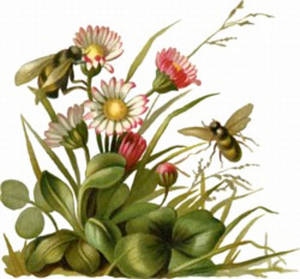Annabelle Simpson, a Pollinator Protector

By Anayeli Camacho, VRG Intern
According to the U.S. Forest Service, animal pollinators are responsible for the reproduction of over 80% of the world’s flowering plants. The USDA says, “Some scientists estimate that one out of every three bites of food we eat exists because of animal pollinators like bees, butterflies and moths, birds and bats, and beetles and other insects … Pollinators visit flowers in their search for food (nectar and pollen). During a flower visit, a pollinator may accidentally brush against the flower’s reproductive parts, unknowingly depositing pollen from a different flower. The plant then uses the pollen to produce a fruit or seed. Many plants cannot reproduce without pollen carried to them by foraging pollinators.”
As the population of pollinators declines, the search for solutions is a focus in many lives. Every day, more people are deciding to join the movement to help sustain our ecosystem. Having the privilege of interviewing a life-giver such as Annabelle Simpson, who devotes much of her energy to the protection of pollinators, I had the opportunity to understand the importance of our need to act in protecting pollinators.
Annabelle said, “The implications of the pollinators’ process is important for us [because] they are responsible for many of the fruits and vegetables that we eat and without pollinators we wouldn’t have bananas, apples, nuts, peaches, just to name a few.”
When a young undergrad student, Annabelle took a course in biochemistry, where she did a paper on fireflies. “Growing up I never really saw fireflies. It fascinated me; this is where my interest in things nature began.” After retiring, Annabelle enrolled in a state university certified program called Master Gardeners. Transitioning from urban to rural living allowed Annabelle a way to invest a great deal of energy in the protection of pollinators, starting with butterflies, then finding her way to the honeybees and a wide range of pollinators.
As knowledge and understanding of pollinators and their importance grew, so did her passion to conserve these beautiful life-givers. Annabelle stated, “After moving to Pennsylvania, I started what we refer to as a pollinator garden, [where we] focused on the encouragement of local native pollinators in this part of Pennsylvania. Pollinator gardens benefit the ecosystem and are a way for us humans to give back to the life that always gives to us. With these gardens, we can supply food to native pollinators. They in return pollinate our crops for continued fruit and vegetable production. It is amazing how many different ways the whole pollinator process is developed. You would never think that so many creatures would be responsible [for] such an important process. You gain a new appreciation for the smallest representatives in nature”
“We have converted their natural habitat into croplands or suburban development, [taking] away from their nesting sites. We have reduced the plant diversity that they need to survive. The diseases and parasites in our changing climate contribute to the overall decline in the population of pollinators. For most of my life I had no thought of pollinators. Growing up in The Bronx [in New York], I didn’t pay attention to [the importance of pollinators]. Nature was on its own; I never really thought of it from a perspective of decline. Simply going to get a little information, a little bit of information makes you put up your head and look around. The next time you see a fly, the first thing you think of isn’t to swat it but AWE that could be a pollinator. You get to appreciate a lot more once you get into a topic like pollination and learn a little more. Then it extends to another topic like compost, [or] what some would call black gold. You open the door to nature, and it will reward you intellectually.”
With a small instinct of curiosity comes a possibility of knowledge beyond what you could have imagined. Pollinators are a crucial part of our ecosystem. Through things such as pollinator gardens we can give back to the life that gives to us so generously.
Additional Information regarding Pollinators:
XERCES Society: https://www.xerces.org
https://ento.psu.edu/research/centers/pollinators
